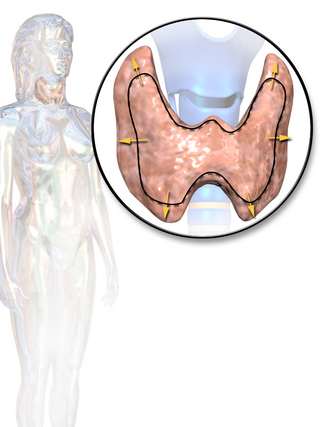
Congenital iodine deficiency syndrome (CIDS) is a medical condition present at birth marked by impaired physical and mental development, due to insufficient thyroid hormone (hypothyroidism) often caused by insufficient dietary iodine during pregnancy. It is one cause of underactive thyroid function at birth, called congenital hypothyroidism, historically referred to as cretinism (obsolete). If untreated, it results in impairment of both physical and mental development. Symptoms may include goiter, poor length growth in infants, reduced adult stature, thickened skin, hair loss, enlarged tongue, a protruding abdomen; delayed bone maturation and puberty in children; and mental deterioration, neurological impairment, impeded ovulation, and infertility in adults.

A goitre, or goiter, is a swelling in the neck resulting from an enlarged thyroid gland. A goitre can be associated with a thyroid that is not functioning properly.

The thyroid, or thyroid gland, is an endocrine gland in vertebrates. In humans, it is in the neck and consists of two connected lobes. The lower two thirds of the lobes are connected by a thin band of tissue called the isthmus (PL: isthmi). The thyroid gland is a butterfly-shaped gland located in the neck below the Adam's apple. Microscopically, the functional unit of the thyroid gland is the spherical thyroid follicle, lined with follicular cells (thyrocytes), and occasional parafollicular cells that surround a lumen containing colloid. The thyroid gland secretes three hormones: the two thyroid hormones – triiodothyronine (T3) and thyroxine (T4) – and a peptide hormone, calcitonin. The thyroid hormones influence the metabolic rate and protein synthesis and growth and development in children. Calcitonin plays a role in calcium homeostasis. Secretion of the two thyroid hormones is regulated by thyroid-stimulating hormone (TSH), which is secreted from the anterior pituitary gland. TSH is regulated by thyrotropin-releasing hormone (TRH), which is produced by the hypothalamus.

Hypothyroidism is a disorder of the endocrine system in which the thyroid gland does not produce enough thyroid hormone. It can cause a number of symptoms, such as poor ability to tolerate cold, a feeling of tiredness, constipation, slow heart rate, depression, and weight gain. Occasionally there may be swelling of the front part of the neck due to goitre. Untreated cases of hypothyroidism during pregnancy can lead to delays in growth and intellectual development in the baby or congenital iodine deficiency syndrome.

Congenital hypothyroidism (CH) is thyroid hormone deficiency present at birth. If untreated for several months after birth, severe congenital hypothyroidism can lead to growth failure and permanent intellectual disability. Infants born with congenital hypothyroidism may show no effects, or may display mild effects that often go unrecognized as a problem. Significant deficiency may cause excessive sleeping, reduced interest in nursing, poor muscle tone, low or hoarse cry, infrequent bowel movements, significant jaundice, and low body temperature.

Iodised salt is table salt mixed with a minute amount of various salts of the element iodine. The ingestion of iodine prevents iodine deficiency. Worldwide, iodine deficiency affects about two billion people and is the leading preventable cause of intellectual and developmental disabilities. Deficiency also causes thyroid gland problems, including endemic goitre. In many countries, iodine deficiency is a major public health problem that can be cheaply addressed by purposely adding small amounts of iodine to the sodium chloride salt.

Vulimiri Ramalingaswami was an Indian medical scientist, pathologist and medical writer. His pioneering research on nutrition got him elected to the National Academy of Sciences, Russian Academy of Medical Sciences and the Royal Society of London.
Iodine deficiency is a lack of the trace element iodine, an essential nutrient in the diet. It may result in metabolic problems such as goiter, sometimes as an endemic goiter as well as congenital iodine deficiency syndrome due to untreated congenital hypothyroidism, which results in developmental delays and other health problems. Iodine deficiency is an important global health issue, especially for fertile and pregnant women. It is also a preventable cause of intellectual disability.
The Jod-Basedow effect is hyperthyroidism following administration of iodine or iodide, either as a dietary supplement, iodinated contrast medical imaging, or as a medication.

Basil Stuart Hetzel was an Australian medical researcher who made a major contribution to combating iodine deficiency, a major cause of goitre and cretinism worldwide.

Thyroid disease is a medical condition that affects the function of the thyroid gland. The thyroid gland is located at the front of the neck and produces thyroid hormones that travel through the blood to help regulate many other organs, meaning that it is an endocrine organ. These hormones normally act in the body to regulate energy use, infant development, and childhood development.

Toxic multinodular goiter (TMNG), also known as multinodular toxic goiter (MNTG), is an active multinodular goiter associated with hyperthyroidism.

Kashin–Beck disease (KBD) is a chronic, endemic type of osteochondropathy that is mainly distributed from northeastern to southwestern China, including 15 provinces. As of 2011, Tibet has the highest incidence rate of KBD in China. Southeast Siberia and North Korea are other affected areas. KBD usually involves children ages 5–15. To date, more than a million individuals have had KBD. The symptoms of KBD include joint pain, morning stiffness in the joints, disturbances of flexion and extension in the elbows, enlarged inter-phalangeal joints, and limited motion in many joints of the body. Death of cartilage cells in the growth plate and articular surface is the basic pathologic feature; this can result in growth retardation and secondary osteoarthrosis. Histological diagnosis of KBD is particularly difficult; clinical and radiological examinations have proved to be the best means for identifying KBD. Little is known about the early stages of KBD before the visible appearance of the disease becomes evident in the destruction of the joints.
Iodine deficiency is a widespread problem in western, southern and eastern parts of China, as their iodized salt intake level is much lower than the average national level. Iodine deficiency is a range of disorders that affect many different populations. It is estimated that IDDs affect between 800 million and 2 billion people worldwide; countries have spent millions of dollars in implementing iodized salt as a means to counteract the iodine deficiencies prevalent today. With China accounting for "40% of the total population", it bears a large portion of those who are iodine deficient.

Iodine is an essential trace element in biological systems. It has the distinction of being the heaviest element commonly needed by living organisms as well as the second-heaviest known to be used by any form of life. It is a component of biochemical pathways in organisms from all biological kingdoms, suggesting its fundamental significance throughout the evolutionary history of life.
Thyroid disease in pregnancy can affect the health of the mother as well as the child before and after delivery. Thyroid disorders are prevalent in women of child-bearing age and for this reason commonly present as a pre-existing disease in pregnancy, or after childbirth. Uncorrected thyroid dysfunction in pregnancy has adverse effects on fetal and maternal well-being. The deleterious effects of thyroid dysfunction can also extend beyond pregnancy and delivery to affect neurointellectual development in the early life of the child. Due to an increase in thyroxine binding globulin, an increase in placental type 3 deioidinase and the placental transfer of maternal thyroxine to the fetus, the demand for thyroid hormones is increased during pregnancy. The necessary increase in thyroid hormone production is facilitated by high human chorionic gonadotropin (hCG) concentrations, which bind the TSH receptor and stimulate the maternal thyroid to increase maternal thyroid hormone concentrations by roughly 50%. If the necessary increase in thyroid function cannot be met, this may cause a previously unnoticed (mild) thyroid disorder to worsen and become evident as gestational thyroid disease. Currently, there is not enough evidence to suggest that screening for thyroid dysfunction is beneficial, especially since treatment thyroid hormone supplementation may come with a risk of overtreatment. After women give birth, about 5% develop postpartum thyroiditis which can occur up to nine months afterwards. This is characterized by a short period of hyperthyroidism followed by a period of hypothyroidism; 20–40% remain permanently hypothyroid.

Creswell John Eastman is the Clinical Professor of Medicine at Sydney University Medical School, Principal of the Sydney Thyroid Clinic and Consultant Emeritus to the Westmead Hospital. Eastman is an endocrinologist and has directed or conducted research and public health projects into elimination of iodine deficiency disorders (IDD) in Malaysia, Indonesia, Laos, Cambodia, Thailand, several Pacific Islands, Hong Kong, China and Tibet and Australia. For his work in remote areas of China, he has been dubbed the "man who saved a million brains".
Gabriella Morreale de Escobar was an Italian-born Spanish chemist who specialised in the thyroid. She and her husband Francisco Escobar del Rey showed that thyroid hormones cross the placenta during pregnancy and are essential for fetal brain development. She established a national newborn screening program for congenital hypothyroidism in Spain and helped to introduce iodised salt to prevent thyroid problems caused by iodine deficiency.
Julián Podoba was a Slovak endocrinologist. His research into iodine deficiency and endemic goitre led to the introduction of iodised salt in Slovakia.













